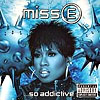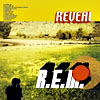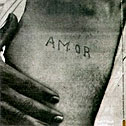
This Week: Missy disappoints again, R.E.M. gets redundant, and Joe Henry creates more gorgeous music.
Missy Misdemeanor Elliott

Miss E...So Addictive (Elektra)
You can't overstate the influence Missy Misdemeanor Elliott and her producer/songwriting partner Timbaland have had on R&B over the past four years. Turn on Top 40 radio these days, and you're likely to hear something that was either written and produced by them or sounds like it was. Those stutter-step electro-bass lines, those half-whispered "chik-chik-chika" breaks between bars, the sweeping strings married to hard-edged dance beats—it's a sound as identifiable and pervasive as Teddy Riley's New Jack Swing was in the early '90s.
So it's disappointing that, after a terrific debut album (1997's Supa Dupa Fly), Elliott herself hasn't lived up to her potential. The sophomore release, 1999's Da Real World, had a handful of great tracks, but it too often substituted attitude and numbing name-calling for its predecessor's melodies and kooky hooks. Miss E...So Addictive is more of the same. The beats are tough and the songs drip with clubby atmosphere—I love the way the background synths burble and loom over the propulsive raga rhythms on "Get Ur Freak On," the first single—but there's nothing much going on in the foreground.
Elliott is a good (but not great) singer and a perfectly capable rapper, but she doesn't seem to have much on her mind beyond telling "haters" to back away from her music and her men. The standout tracks, which also include "Lick Shots" and "Whatcha Gon' Do," distinguish themselves not so much by breaking that mold as by giving it a little more spark and edge than the others. What's sadly missing is the spacy sense of funky fun and that was so present on early tracks like "Hit 'Em Wit Da Hee" and "Izzy Izzy Aah." It's as if, having conquered their corner of the universe, Elliott and Timbaland are no longer capable of enjoying it.
—Jesse Fox Mayshark
R.E.M.
Reveal (Warner Bros.)

Up, R.E.M.'s first record without drummer Bill Berry, took tentative steps toward incorporating experimental sound effects into the Southern Gothic jangle pop/arena rock the band had perfected a decade earlier; now, on Reveal, the second post-Berry album, the studio-enhanced soundscapes eclipse nearly everything else—but not necessarily to the best effect. In its most striking spots, R.E.M. does on Reveal what they did so well on Automatic for the People—elegant, elegiac set pieces with spare piano, subdued, supple performances from Peter Buck and Mike Mills, and inscrutable lyrics that still managed to convey the perfect mood. "All the Way to Reno (You're Gonna Be a Star)" is a pleasant update of "Man on the Moon," and "Imitation of Life" is an energetic, catchy single marred only by a belabored run of synthesizer blips that sound like nothing so much as prime Emerson, Lake & Palmer.
Unfortunately, the best moments—and there are plenty—are scattered among deliberately paced melodies that float along a wave of atmospheric keyboard suites and arbitrary electronic doodles. The chorus to "Beat a Drum," for example, is stirring, but it's a chore to get there, and it doesn't last long enough once you find it.
That's the problem with the whole album: too few bright moments, and you've already heard the ones that are there.
—Matthew T. Everett
Joe Henry
Scar (Mammoth)

On the cover of Joe Henry's ambitious new album Scar, there's a grainy black and white photo of man exposing his chest to reveal a tattoo: AMOR.
Indeed, it's usually love that scars us the most, and Henry's album is about the ways that love marks us, the way we try to fill the scars and the ways we really want to be scarred. Henry has always been more of an impressionist than a story teller, and Scar doesn't give us any morals or even stories. It simply dwells in the smoky midst of pain in vignettes that further expand Henry's jazz-influenced experimentation.
The result is at times strikingly beautiful, but sometimes his compositions seem merely an excuse for sonic musings that aren't all that meaningful.
But there are plenty of high points, such as "Richard Pryor Addresses A Tearful Nation," where Henry imagines the love-hate relationship the comic had with America, singing: "I look at you as the thing I wanted most/ You look at me and it's like you've seen a ghost." As the song closes, the great jazz pioneer Ornette Coleman chimes in with a gorgeous lament on alto saxophone.
The second track, "Stop," has already been recorded by Madonna (Henry's sister-in-law) as "Don't Tell Me." While Madonna's production may be smarter in terms of pop sensibility, Henry's version is boozy poetry and more believable. Both versions prove what a great songwriter Henry is.
At times, Henry bogs down in mood pieces that are neither striking nor all that interesting, as with "Lock and Key" (the whole song seems a set up for the final line, "Free at last and begging Him for jail," as the music trails off in a ghostly echo.)
Scar isn't Henry's masterpiece (1996's Trampoline is). But it is a fine addition to the remarkable portfolio of an underappreciated artist.
—Joe Tarr

May 31, 2001 * Vol. 11, No. 22
© 2001 Metro Pulse
|